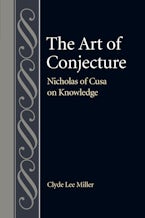- Home
- Studies in Philosophy and the History of Philosophy
- philosophy
- The Art of Conjecture
Preparing your PDF for download...
There was a problem with your download, please contact the server administrator.
The Art of Conjecture
Nicholas of Cusa on Knowledge
Studies in Philosophy and the History of Philosophy
Imprint: Catholic University of America Press
"Learned ignorance," the recognition that God is beyond us and our knowing capacities is the theological concept for which Nicholas of Cusa is most famous. Despite God’s apparent absence Nicholas offers original ways to think about God that would unite his presence with his absence. He called these proposals "conjectures" ( coniecturae). Conjecture and conjecturing are central to the methodology of Nicholas’s philosophical theology and to his thinking about human knowledge.
By using concrete examples from the everyday life of his times as symbolic imagery Nicholas makes what we say about God imaginatively available and theoretically plausible. He called such conjectural symbols "aenigmata" (= "symbolic or ‘enigmatic’ conjectures") because they partially clarify and likewise point to an exact truth that is beyond us. Novel and imaginative, Nicholas’s conjectural examples break with the traditional medieval Aristotelian examples and provide further evidence of his role as a figure bridging medieval and Renaissance thought.
Following his earlier book, Reading Cusanus (The Catholic University of America Press, 2003), Clyde Lee Miller here examines and comments on the meaning of "conjecture" in Nicholas of Cusa. The Art of Conjecture: Nicholas of Cusa on Knowledge explores what Nicholas meant by conjecture and its import as demonstrated in his treatises and sermons. Beginning with Nicholas’ On Conjectures, Miller analyzes a series of conjectural symbols and proposals across Nicholas’s less frequently discussed texts and recently published sermons. This early Renaissance thinker offers an original and ground-breaking way of framing speculation in philosophical theology and more generally in philosophy itself.
Clyde Lee Miller is a professor of philosophy at Stony Brook University.
"This is a very important contribution. Few, if any, interpreters of Cusanus writing in English are as insightful and concise in their expositions. Will appeal to intellectual historians, philosophers, and theologians."
~Thomas M. Izbicki, Rutgers University
"Our late modern world trades less in certainties than in layers of conjecture, as reason feels burdened by pluralism and doubt. But already in the fifteenth century Nicholas of Cusa learned the art of flipping alterity on its head, a dialectical jujitsu that cleared a way beyond scholasticism. Clyde Lee Miller’s new book brings his trademark clarity and acumen to this most relevant and challenging of themes. How can we draw near to the world, and to God, precisely through our conjectural knowing? Miller takes readers on a tour of Cusan wisdom on measurement, mapmaking, optics, and even God’s mysterious non-Alterity. Both experts and beginners have much to learn from this master teacher."
~David Albertson, University of Southern California
" The Art of Conjecture provides a careful, lucid, and accessible exposition of Nicholas of Cusa’s reliance on a method of philosophical theology that employs ‘conjectures’ as tools for both embracing and exploring objects of inquiry that are beyond our natural capacities to understand with precision or certainty. In particular, Miller shows that, for Nicholas of Cusa, this conjectural method is meant to activate our awareness of the dialectical structure of God’s giving and the possibilities of human receptivity to God’s love. On the basis of this exposition, Miller’s concluding chapters also gracefully articulate his hope that emulating Nicholas’ conjectural approach may attune the method's practitioner to a form of obedience, humility, and love that manifests an ideal Christian life."
~Jason Aleksander, San Jose State University
"Miller supports his interpretations with references to scholars and their publications in languages other than English as well—not the least among the many virtues of this well-written and informative book."
~Heythrop Journal
"In developing Nicholas’s ideas, Miller refers to the Latin texts; Hopkins’s translations are used but modified when necessary. The interpretation of Nicholas’s thought is clear and often serves as the basis of the proper work of translation, linking his thought to contemporary understanding of knowledge and perception. The author’s occasional repetitions are due to the fact that the book collects some original papers, but do not distract from the argument. Finally, Clyde Lee Miller supports his interpretations with references to scholars and their publications in languages other than English as well—not the least among the many virtues of this well-written and informative book."
~Heythrop Journal

